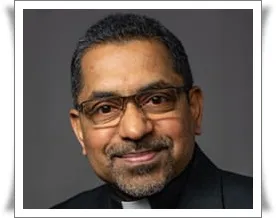- About Us
- Admission
- Academics
- Examination
- IQAC
- Research
- IIC
- Placements
- Student Support
- Anti - Ragging
- Citizenship Training
- Counselling
- Equal Opportunity Centre
- Mentorship
- Mid day Meal Scheme
- Scholarship
- Sexual Harassment (Prevention and Redressal)
- CQAC and SQAC
- Students Welfare
- Capability Enhancement and Development Schemes
- Assessing Learning Levels
- International Desk
- Student Grievance Redressal Committee SGRC
- St. Joseph's Boys Hostel - Apply
- Outreach
- Student Activities
- Infrastructure
- Sports
- Alumni Activities

Rev. Dr. Charles Lasrado SJ
Dear Students,
Education, in Jesuit tradition aims at developing the whole person. It approaches academic subjects wholistically addressing the intellect, imagination, emotions and conscience of the students. It explores connection among the available facts, questions, problems, insights, solutions and conclusions. It examines the patterns of unjust systems embedded in our cultures and traditions. It encourages students to learn each subject’s implications for what it means to be a human being and in what way one can contribute to the welfare of all.
In 1993, the international commission on Apostolate of Jesuit Education issued “Ignatian Pedagogy: A Practical Approach” as a model for the learning process in Jesuit institutions. It addresses the teacher-learner relationship and has practical meaning and application for classroom interaction. This model is called Ignatian Pedagogical Paradigm (IPP) also known as Integrated Pedagogical Paradigm. It encapsulates five elements that should challenge the learning experience viz., Context, Experience, Reflection, Action and Evaluation.
Context : The educator in Jesuit tradition understands the context of the student and where he is hailing from. This enables the educator to accompany the students with a sense of personal care.
Experience : The educator enables the students to recollect already known aspects of the subjects and assimilate new information.
Reflection : Jesuit education empowers the students to deploy one’s memory, understanding, imaginations and feelings into what is being studied and critically examine the things being taught. This enables the students to continue their journey of seeking truth.
Action : Jesuit education propels the students to commit to improve the condition of the world through actions that are rooted in justice, peace and love.
Evaluation : In Jesuit education, the evaluation goes beyond testing the academic mastery. It calls for students’ generosity to respond to the common good.
A warm welcome to each one of you to SJCC and to experience Jesuit Education!


